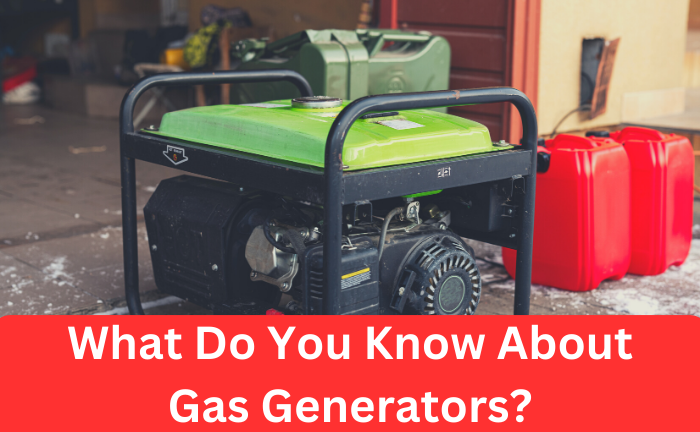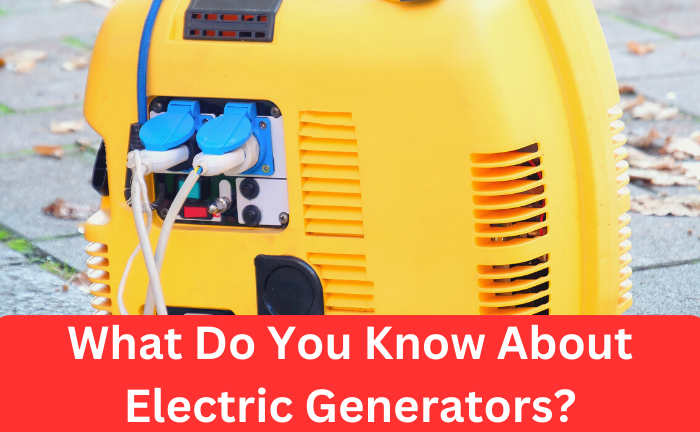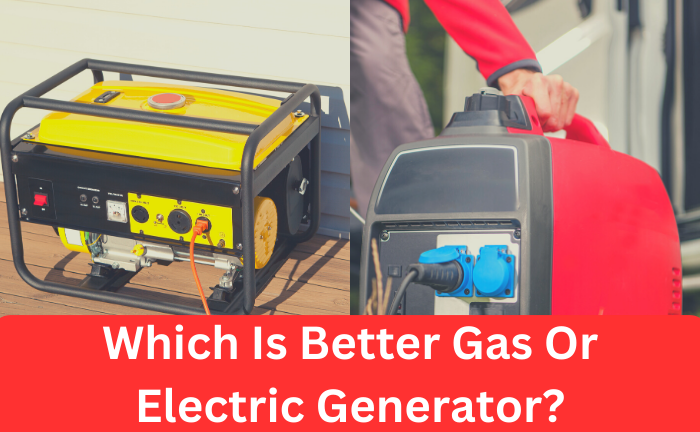Generators are certainly the need of the hour, whether you’re a homeowner or running a business. You must need a backup to run your chores fluently even in power outages. Whenever you think about generators, two basic types of generators will come to your mind; gas and electric generators.
Your particular needs will decide which generator is better for you. According to my research, If you need a quieter and clean energy option, an electric generator is best for you. However, a gas generator is perfect for running heavy appliances that need more power.
In this writing, I’ll walk you through the pros and cons of both generators and also you’ll get to know which one is better for you
Table of Contents
What Is A Gas Generator?

As you can guess from the name, gas generators are the ones that produce electricity from natural gas. You must be aware that natural gas is the most abundant resource that can act as a burning fuel.
Like other generators, gas generators also generate a few emissions. However, gas generators are capable of handling large machinery because you don’t need to refuel it every second week.
Let me make it more understandable for you by stating a few advantages and disadvantages of gas generators. Here you go.
Pros
Here are the windfalls of gas generators.
Cleaner Than Other Fuels
The most initial advantage that you’ll see in a gas generator is cleanliness. You’ll notice that your gas generator will create very minimal emissions as compared to other fuels.
Budget Friendly
I’ve noticed that a gas generator is less expensive than other generators as gas is the most abundant resource in the world. If you’re tired of your daily expenses and want to add a generator to your household, gas generators are big thumbs up.
No Pungent Odors
You must know that numerous generators excrete quite a pungent smell of burning fuels that seems unbearable. You’ll be amazed to hear that a gas generator does not exhale any kind of bad smell.
Portability
Indeed, gas generators are more portable than other types of generators. You must know that the gas generators are designed to be easily movable.
Cons
Let’s delve into and explore the drawbacks of gas generators.
Disrupted Gas Supply
Undoubtedly, gas is one of the most abundant resources on Earth. According to my collected data, you may face disrupted gas supply during periods of natural calamities. The shortage of gas will result in the low electricity production and cause delay in your office chores.
Noise
Another disadvantage that might be annoying for you is the generator’s noise. Your gas generator will make irritating noise while emitting carbon monoxide. It can be harmful to you and your loved ones. Hence, I’ll suggest you keep your gas generator outside the house.
Limited Energy Source
You might know that gas is a natural resource that can be ended anytime. You can’t produce gas artificially. Your residential area might face lack of gas due to various reasons.
So, there will be nothing wrong if I say that natural gas generators are restricted to natural production of gas. Therefore, the end of natural gas will be the death of gas generators.
What Is An Electric Generator?

Here comes the time to know more about an electrical generator. An electrical generator is a portable generator that can produce electricity with gas, diesel, or propane-powered engines. You must know that various industries including telecommunication towers use electric generators to cope up with emergencies. Let’s dive in and explore the pros and cons of an electric generator.
Pros
Here are a few benefits of using an electrical generator.
Emergency Backup
I have concluded from my vast research that an electric generator is mostly used as an emergency backup. You might be aware that every household and business has an electric generator as an emergency backup to overcome sudden power outages.
You’ll be amazed to know that an electric generator can easily run household essentials including heaters, refrigerators, small tools, and many more.
Durability
Here I’ll talk about the major benefit of an electric generator, which is its durability. Whenever you purchase an expensive item, you always expect its long-lasting assistance.
Likewise, an electric generator will face all the wear and tear due to various factors, but keep on working. Therefore, environmental conditions can barely harm your electrical generator.
Cons
The disadvantages of an electric generator are given below.
Limited Use
If you have kept the portable electric generator as an emergency backup, you’ll face numerous restrictions. These limitations include the running of plasma tv, an air conditioner, etc.
You can not light up your luxury items on a portable electric generator.
Expensive
If you are thinking of purchasing an electric generator, you must know that the electric generators are quite pricey as compared to the gas generators.
Difference Between A Gas Generator And An Electric Generator
Apologies for the confusion. Here’s the corrected table:
| Difference | Gas Generator | Electric Generator |
|---|---|---|
| Power Output | Can produce up to 2X more power than electric generators | Usually louder (depending on the model) |
| Noise Level | Usually louder (depends on the model) | Generally quieter |
| Maintenance | Requires more maintenance | Easier to maintain |
| Runtime | Runs as long as fuel is provided | Works until battery lifetime |
| Fire Hazard | More fire hazards | Fewer fire hazards |
As I have described the pros and cons of both generators, here comes the time to figure out the major differences between a gas generator and an electric generator. Here you come.
- Gas generators can produce up to 2X more power than electric generators.
- Gas generators are usually louder than electric generators. The noise also depends on the generator’s model.
- Portable electric generators are quite easy to maintain as compared to gas generators.
- The runtime of both generators is also distinctive. The gas generators will keep on running as long as you’re fulfilling the resources. Meanwhile, an electric generator will work until the lifetime of its battery.
- Electric generators are safe to use as there are fewer fire hazards than gas generators.
Which One Is Better For You?
If you are still wondering which one is better for you? Don’t worry. Let me make it easier for you.
If you want a generator to run large equipment or for outdoor activities, a gas generator is suitable for you.
Meanwhile, an electric generator is a perfect selection to power your small electronics. At the end of the day, selection will depend on your particular needs.
Related: Do Generators Run On Gas?
Conclusion
In conclusion, I’d like to say that you must consider the advantages and disadvantages of both gas and electric generators before making a choice. You can select the best option for you by comparing the given factors with your specific requirements.
Moreover, you must follow the safety guidelines and proper maintenance to keep your generator working fluently.

